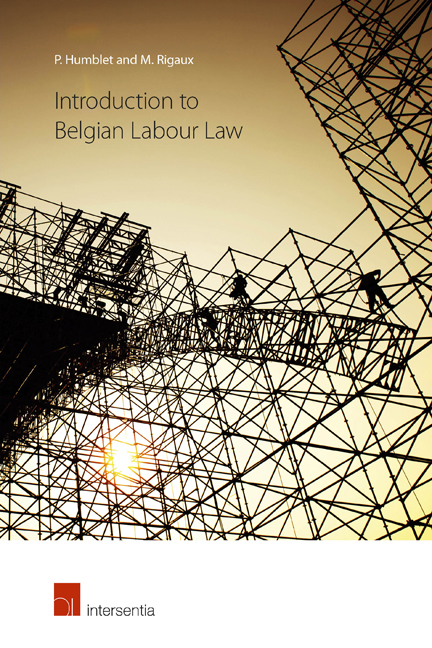Book contents
- Frontmatter
- Preface
- Contents
- List of Abbreviations
- PART I EMPLOYMENT LAW
- I THE CONTRACT OF EMPLOYMENT
- II CONCLUDING THE CONTRACT
- III EMPLOYMENT
- IV TERMINATION OF EMPLOYMENT
- V SPECIAL AND DEVIATING TYPES OF EMPLOYMENT CONTRACTS
- PART II INDUSTRIAL RELATIONS LAW
- I FREEDOM OF ASSOCIATION
- II TRADE UNIONS AND EMPLOYERS’ ASSOCIATIONS
- III INSTRUMENTS FOR SOCIAL DIALOGUE
- Chapter 1 General Overview
- Chapter 2 Structured Bipartite Negotiation
- Chapter 3 The Union Delegation
- Chapter 4 Supranational Consultation
- Chapter 5 Collective Labour Agreements
- IV FUNDS FOR SOCIAL SECURITY
- V INDUSTRIAL ACTION
- In Cauda
- General Bibliography
- E-addresses
Chapter 5 - Collective Labour Agreements
from III - INSTRUMENTS FOR SOCIAL DIALOGUE
Published online by Cambridge University Press: 13 December 2017
- Frontmatter
- Preface
- Contents
- List of Abbreviations
- PART I EMPLOYMENT LAW
- I THE CONTRACT OF EMPLOYMENT
- II CONCLUDING THE CONTRACT
- III EMPLOYMENT
- IV TERMINATION OF EMPLOYMENT
- V SPECIAL AND DEVIATING TYPES OF EMPLOYMENT CONTRACTS
- PART II INDUSTRIAL RELATIONS LAW
- I FREEDOM OF ASSOCIATION
- II TRADE UNIONS AND EMPLOYERS’ ASSOCIATIONS
- III INSTRUMENTS FOR SOCIAL DIALOGUE
- Chapter 1 General Overview
- Chapter 2 Structured Bipartite Negotiation
- Chapter 3 The Union Delegation
- Chapter 4 Supranational Consultation
- Chapter 5 Collective Labour Agreements
- IV FUNDS FOR SOCIAL SECURITY
- V INDUSTRIAL ACTION
- In Cauda
- General Bibliography
- E-addresses
Summary
Belgium uses legally binding collective labour agreements. In this regard it is important to note that the representative unions have a monopoly for concluding such agreements. They also conclude collective labour agreements at enterprise level. Limiting representativeness to the three major unions has been very important in terms of social stability as there is little or no competition between the various unions.
SECTION 1. ORIGIN OF THE COLLECTIVE LABOUR AGREEMENTS ACT
The oldest collective labour agreement can be traced back to the agreement on pay and working conditions concluded by employers and workers in the cloth industry of Verviers in September 1789.
However, the Le Chapelier Act complicated all further experiments of this nature so that only 19 agreements of this kind were concluded between the fall of the Ancien Regime and the First World War.
In 1919, the country was rocked by a significant outbreak of collective conflicts despite the government's commitment to new social policy. Thousands of blueand white-collar workers went out on strike. In order to stabilise the country the government tried arbitration to force workers to reach a solution. As the situation did not improve, the authorities set up joint committees in the mines and the metallurgical industry where strikes were the most vehement, to examine the possibility of cutting working time. This process of institutionalised consultation was applied many times in the years to come. In 1939, roughly 47 committees of this kind were active. Their consultative structure was ideal for concluding collective labour agreements.
During the period between the two World Wars, a lot of attempts were made to grant legal status to collective labour agreements, but for various reasons these failed.
The biggest problem relating to collective labour agreements was the question as to what extent these conferred rights to workers. This problem was partly solved by Articles 12 and 13 of the Decree Law of 9 June 1945. These enabled joint committees or unions to request, by way of Royal Decree, that the individual standard provisions of a collective labour agreement be granted binding effect erga omnes.
- Type
- Chapter
- Information
- Introduction to Belgian Labour Law , pp. 231 - 246Publisher: IntersentiaPrint publication year: 2016

